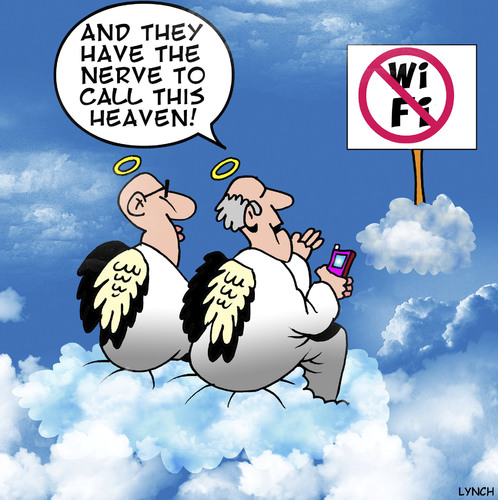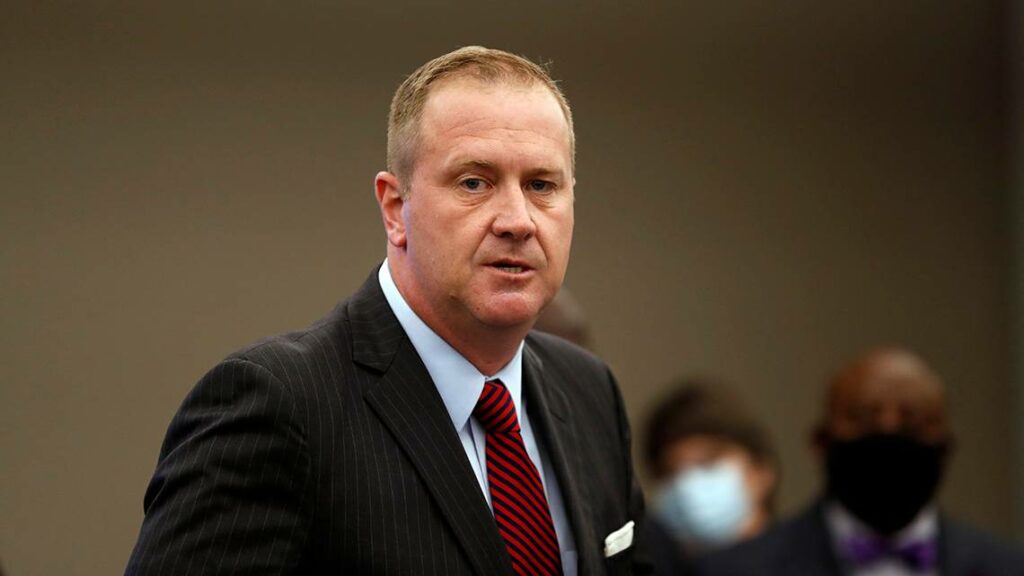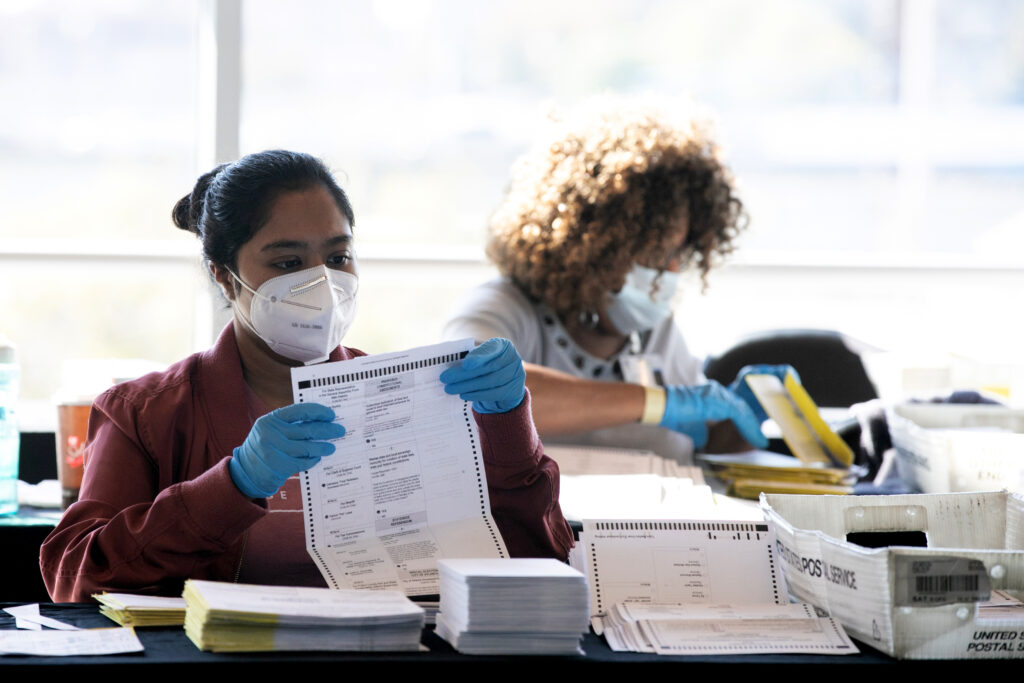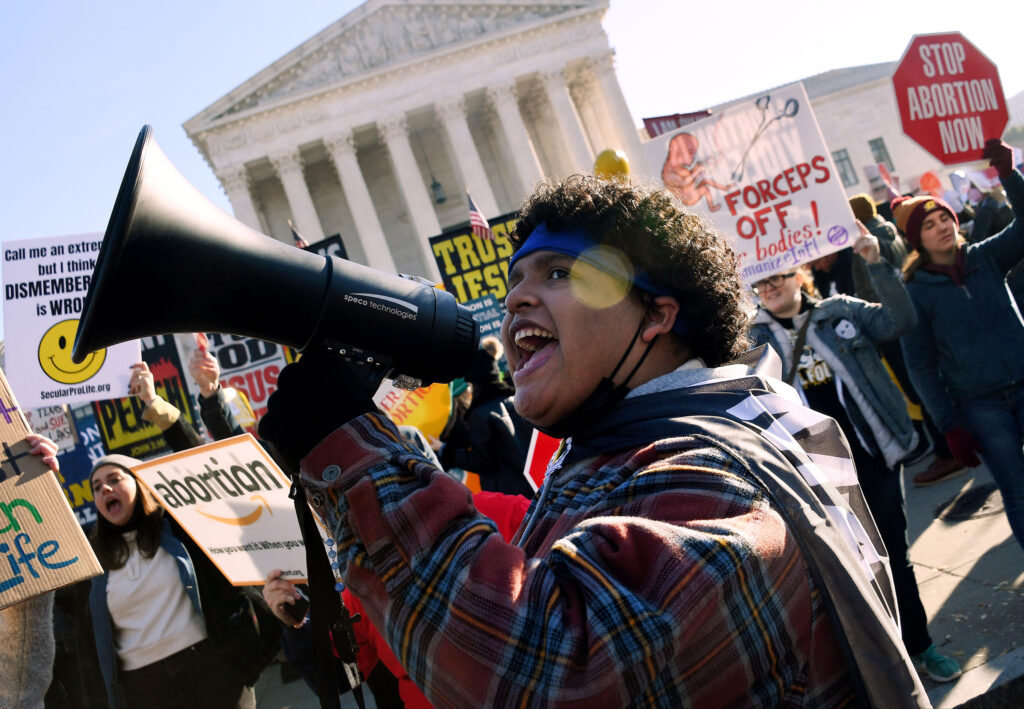Do y’all remember ALEC? The American Legislative Exchange Council is a right-wing organization with a lot of wealthy supporters that creates model bills for state legislatures to copy and pass into law. It’s been around since the 1970s, but in 2012 it came to everyone’s attention. Political pressure caused a lot of their corporate donors to drop out.
But it didn’t die. Now ALEC is one of the forces — not the only one — pushing parents into a frenzy to ban Critical Race Theory from schools, even though it’s unlikely CRT really makes an appearance in elementary and secondary education. The people screaming about it mostly don’t know what it is.
In academia, a “critical theory” in the social sciences is a focus on society, culture, law, etc. in order to reveal and challenge embedded power structures. And CRT, which has been around for decades, says that race is a social construct and that racism is not just a matter of individual bigotry but is baked into the legal and criminal justice systems and other widespread policies and practices. It’s a means to assess where racism is systemic, in other words. This isn’t something that would be introduced to third graders, I don’t believe.
ALEC’s web page speaks of CRT as if it were a disease. Here’s a screen shot —
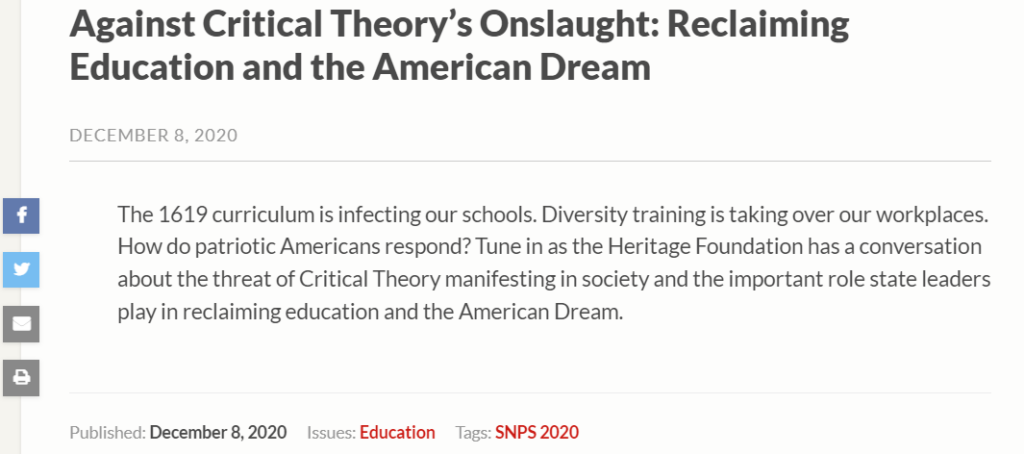 Note that they’ve been at this for over a year, at least. In June, NPR reported on how ALEC and other groups have been fueling the fight against CRT. ALEC has been hosting webinars and making YouTube videos that get widely circulated among righties on social media. By June there were at least 165 local and national groups “trying to disrupt or block lessons on race and gender.”
Note that they’ve been at this for over a year, at least. In June, NPR reported on how ALEC and other groups have been fueling the fight against CRT. ALEC has been hosting webinars and making YouTube videos that get widely circulated among righties on social media. By June there were at least 165 local and national groups “trying to disrupt or block lessons on race and gender.”
Few of those lessons had anything to do with CRT. The parents and local activists inspired to show up at school board meetings and scream about CRT and making their little white children feel bad wouldn’t know CRT from a toaster. Opponents of CRT “are using critical race theory as really more of a catchall to include anything teaching students about systemic racism, any mention of white privilege, and, really, the definition that they’re using has expanded to include anything related to equity, diversity and inclusion,” the NPR report said.
Behind this is a bigger goal, which is to re-ignite something like the old Tea Party movement going in to the 2022 midterms. Instead of getting the rubes worked up about taxes and death panels, now they are worked up about confronting racism and everything else they don’t like about modernity in public schools. This appears to have worked pretty well in the recent Virginia gubernatorial election.
The banning of CRT has left teachers in the dark about how to teach race, since they weren’t teaching CRT to begin with, and it appears that any mention of race in any context brings out the zombies. A Tennessee high school teacher was fired for discussing race in a “contemporary issues” class. Those still teaching are probably doing a lot of self-censorship.
South Dakota recently passed a bill that explicitly bans CRT. No SD public school, from kindergarten to 12th grade, may teach CRT, which the bill defines as “the theory that racism is not merely the product of learned individual bias or prejudice, but that racism is systemically embedded in American society and the American legal system to facilitate racial inequality.”
Of course, the fact that South Dakota passed this law is pretty solid proof that CRT is needed.
Note also that while I was looking up the South Dakota law I found an innocuous-looking site labeled “Critical Race Training in Education.” The site is nothing but anti-CRT propaganda.
Oklahoma passed a law banning CRT as well as anything about gender and sexual diversity in classrooms last spring. Now a lawmaker wants to pass a more detailed bill that would pretty much stop Oklahoma teachers from teaching much of anything about American history. This bill bans the following —
- Any teaching that America has more culpability, in general, than other nations for the institution of slavery;
- That one race is the unique oppressor in the institution of slavery;
- That another race is the unique victim in the institution of slavery;
- That America, in general, had slavery more extensively and for a later period of time than other nations; or
- The primary and overarching purpose for the founding of America was the initiation and perpetuation of slavery.
Basically, this guy wants to be sure U.S. schoolchildren aren’t taught the history of slavery.
First off, let’s be clear what we’re talking about when we are talking about slavery. Slavery in the U.S. was “chattel” slavery, in which one person entirely owns another. It was also hereditary, meaning that an enslaved person’s children also were automatically enslaved. Through world history all kinds of people bound all kinds of other people into arrangements that get labeled “slavery,” but these arrangements weren’t always this extreme.
It’s also the case that slavery existed in most parts of the world at one time or another, and all kinds of people have enslaved all kinds of other people. But the United States came into existence in the latter part of the 18th century. That, for example, Spartans enslaved captured Athenians in the 5th century BCE is not an excuse.
To take these one at a time —
#1. It’s true that much of western Europe still permitted chattel slavery at the beginning of the 19th century, especially in those nations with colonies in Africa and the Western Hemisphere. Most if not all elminated slavery before the U.S. did, but not by a great many years.
In the Western Hemisphere, the last nation to eliminate slavery was Brazil, in 1888. Note that after the U.S. Civil War some plantation owners relocated to Brazil to continue their “way of life.” See The Confederacy Made Its Last Stand in Brazil.
Still, this is a “Spanky did it too” kind of defense. Just because other nations were doing it doesn’t make it right.
Chattel slavery actually became more entrenched in the Americas during the 18th and 19th centuries than it had been earlier. Plantation cash crops like cotton and tobacco required a lot of labor, and Africans were imported and enslaved to provide that labor.
#2 and #3. As I have already said, if you look at world history going back to its beginnings, you can find many forms of slavery among people of all races. However, if we’re looking at the formative years of the United States, it really was mostly white people enslaving mostly black people. The only exceptions I know of were that the Cherokee and some other indigenous tribes owned African slaves for a time. A very small number of free black slave owners have been documented.
Native Americans also were sold into chattel slavery, especially in the 18th century. As much as white supremacists claim otherwise, however, whites did not become chattel slaves in the American colonies. Slavery in North America was a permanent and inherited condition passed on to subsequent generations. Some whites who came here were indentured servants, which could be harsh, but once they had worked off their contracts they were free. Their children were born free. Families were not broken up and sold away from each other. That happened only to nonwhites.
Further, it was the big plantation owners of the Southern states who were determined to maintain the institution of slavery and spread it into the western territories. And the big plantations owners were white. Further, by the 18th and 19th centuries slavery was being justified by claims that black people were either not entirely human or were not capable of being civilized, so it was a kindness to enslave them.
To pretend that slavery in the United States was not an institution that allowed white people to own black people is to hallucinate. Alexander Stephens, vice president of the Confederacy, explained this in his infamous “cornerstone” speech:
“Our new government is founded upon exactly the opposite idea; its foundations are laid, its corner-stone rests, upon the great truth that the negro is not equal to the white man; that slavery subordination to the superior race is his natural and normal condition. This, our new government, is the first, in the history of the world, based upon this great physical, philosophical, and moral truth.”
By the 19th century, and really long before that, the institution of slavery in the U.S. was all about enslaving people of African ancestry to labor for white people. By the 19th century, in most slave states, black people found without papers proving their status as free could be seized and forced into slavery. Just because they were black. To pretend there was no racial component to slavery in the U.S. is beyond lunacy.
#4 — In 1850, 3,204,313 people were enslaved in the United States. This was out of a population of 23,191,876. I believe this means that more than 13 percent of the population of the U.S. was enslaved (you are cordially invited to check my math). I don’t have data on other countries in 1850 to know how that measures up, but I suspect that 13 percent of the population is on the high side.
#5 — I believe this statement is a distortion of a conclusion from the 1619 Project. Basically, the Project argues that “Enslavement is not marginal to the history of the United States; it is inextricable. So many of our traditions and institutions were shaped by slavery, and so many of our persistent racial inequalities stem from its enduring legacy.” That’s absolutely true. It’s also true, the Project says, that protecting the institution of slavery was one of the reasons colonists supported separation from Britain. Slavery was not illegal in Britain, but an abolitionist movement was gaining steam there by 1776. I think that’s what is being distorted into “The primary and overarching purpose for the founding of America was the initiation and perpetuation of slavery.”
Anyway — basically, the Oklahoma law, if passed, would outlaw the teaching of American history in Oklahoma. Teachers could only present a distorted and highly cherry picked version of it.
Along with banning the teaching of American history, Republicans are going whole hog into book banning and book burning these days. Books dealing with race and gender equality, or LBGTQ issues, or anything Republicans want to pretend isn’t there, are being yanked from school shelves. Some Republican politicians want these books burned.
Yep, we’re living in interesting times.

